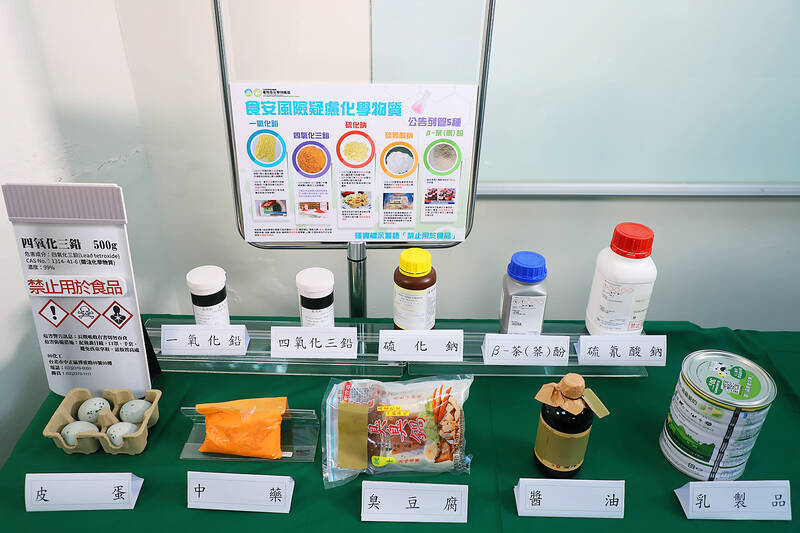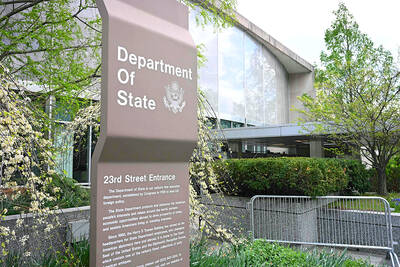Fifteen compounds have been added to a list of monitored chemicals due to health and public safety concerns, the Environmental Protection Administration (EPA) said in a statement on Thursday.
The Toxic and Chemical Substances Bureau said it had enacted controls on lead (II, IV) oxide, also known as red lead, after it was determined that a Chinese medicine clinic in Taichung had used it in a product also containing powdered cinnabar.
Hopefully tightening controls of red lead would prevent similar practices, the bureau said.

Photo courtesy of the Environmental Protection Administration
Long-term ingestion of red lead can cause lead poisoning, movement disorders and damage to the heart, reproductive and endocrine systems, it said.
Excessive ingestion can also trigger a coma or an epileptic seizure, the bureau said.
Also banned were lead (II) oxide (lead monoxide), sodium sulfide, sodium thiocyanate and 2-naphthol, it said.
Lead monoxide is sometimes used to accelerate fermentation of century eggs, while there have been reports of stinky tofu vendors illegally adding sodium sulfide to their wares as a scent enhancer, it said.
Sodium thiocyanate and 2-naphthol are sometimes used as preservatives in dairy products and soy sauce, the bureau said.
It would also monitor calcium ammonium nitrate, ammonium perchlorate, sodium percarbonate, sodium nitrate, calcium nitrate, nitromethane, sodium azide and aluminum phosphide, which are sometimes used in improvised explosive devices, it said.
Psychoactive substances 1,4-butanediol and glaucine are also to be monitored, it said, adding that the addition of the two chemicals was done in response to reports that other countries have filed with the UN Office on Drugs and Crime.
The 15 substances are not to be used without permission and must not be traded on the Internet, the bureau said.
People or entities permitted to use monitored chemicals must label them correctly, account for their use and declare their use by publishing the documents online monthly, the bureau said.
Products that are made using monitored chemicals must be labeled as not intended for human consumption, it said.
Products that contain the chemicals linked to explosives must not be sold, imported, transported or stored without permission, the bureau said, adding that they are subject to quotas on storage volumes.
To store such products, disaster prevention and contingency plans must be submitted, it said, adding that liability insurance must be purchased and people must be trained to respond to an emergency involving the products.
Moreover, alarms and detectors must be installed at storage locations, while applications are required to to transport them, it said.

Hong Kong singer Eason Chan’s (陳奕迅) concerts in Kaohsiung this weekend have been postponed after he was diagnosed with Covid-19 this morning, the organizer said today. Chan’s “FEAR and DREAMS” concert which was scheduled to be held in the coming three days at the Kaohsiung Arena would be rescheduled to May 29, 30 and 31, while the three shows scheduled over the next weekend, from May 23 to 25, would be held as usual, Universal Music said in a statement. Ticket holders can apply for a full refund or attend the postponed concerts with the same seating, the organizer said. Refund arrangements would

Former president Tsai Ing-wen (蔡英文) on Monday called for greater cooperation between Taiwan, Lithuania and the EU to counter threats to information security, including attacks on undersea cables and other critical infrastructure. In a speech at Vilnius University in the Lithuanian capital, Tsai highlighted recent incidents in which vital undersea cables — essential for cross-border data transmission — were severed in the Taiwan Strait and the Baltic Sea over the past year. Taiwanese authorities suspect Chinese sabotage in the incidents near Taiwan’s waters, while EU leaders have said Russia is the likely culprit behind similar breaches in the Baltic. “Taiwan and our European

Taiwanese indie band Sunset Rollercoaster and South Korean outfit Hyukoh collectively received the most nominations at this year’s Golden Melody Awards, earning a total of seven nods from the jury on Wednesday. The bands collaborated on their 2024 album AAA, which received nominations for best band, best album producer, best album design and best vocal album recording. “Young Man,” a single from the album, earned nominations for song of the year and best music video, while another track, “Antenna,” also received a best music video nomination. Late Hong Kong-American singer Khalil Fong (方大同) was named the jury award winner for his 2024 album

The US Department of State on Monday reaffirmed that US policy on Taiwan remains unchanged, following US President Donald Trump’s use of the term “unification” while commenting on recent trade talks with China. Speaking at a wide-ranging press conference, Trump described what he viewed as progress in trade negotiations with China held in Geneva, Switzerland, over the weekend. “They’ve agreed to open China — fully open China, and I think it’s going to be fantastic for China. I think it’s going to be fantastic for us,” Trump said. “I think it’s going to be great for unification and peace.” Trump’s use of the